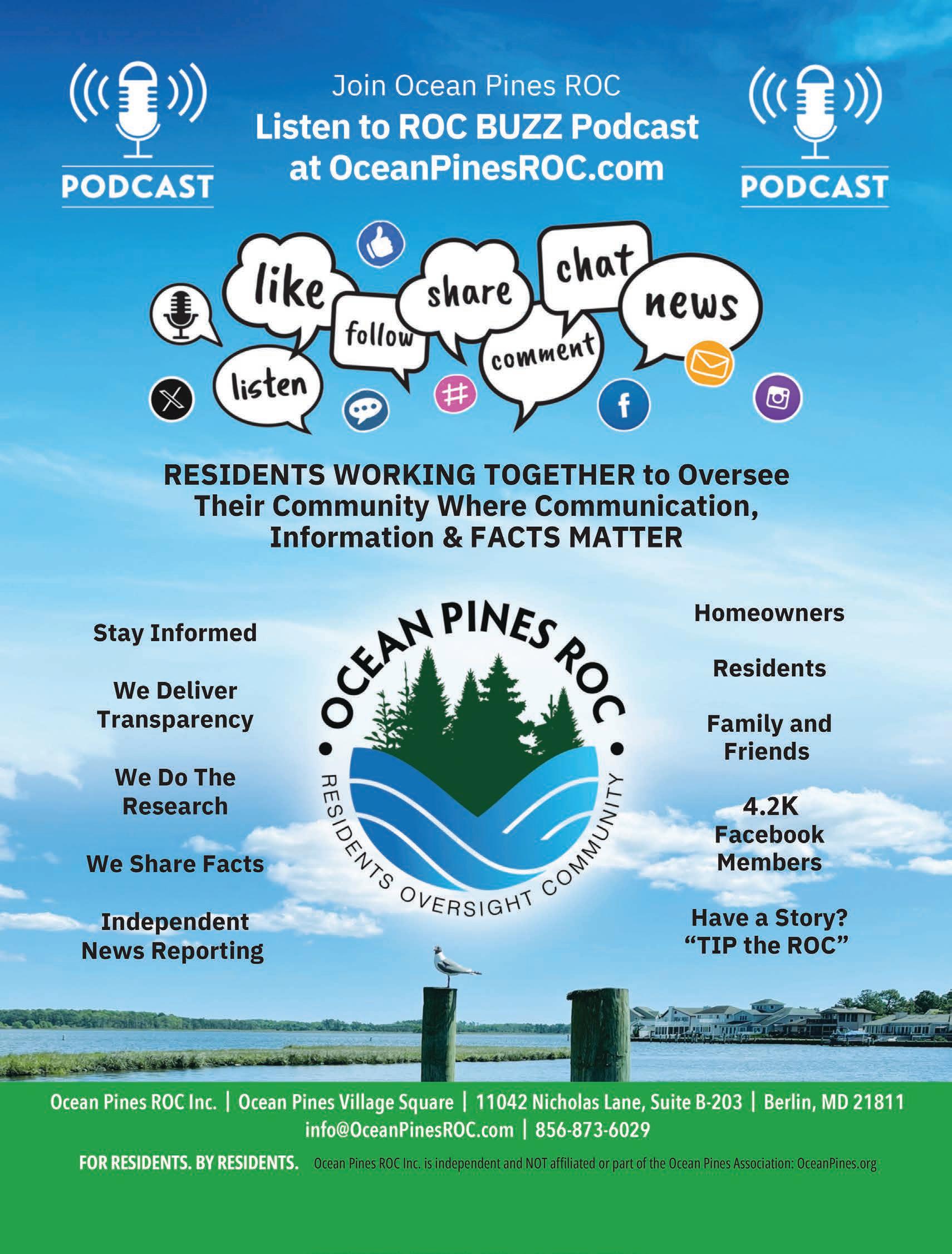July 15, 2025
Unauthorized use of OPA logo in campaign ad raises election integrity concerns
By Sherrie Clifford ROC Edition Publisher
The integrity of the 2025 Ocean Pines Association (OPA) Board of Directors election has come under scrutiny following the publication of campaign advertisements by current board president and candidate Stuart Lakernick. The ads, which appeared earlier this month in both the Bayside Gazette and Ocean Pines Progress, prominently featured the official OPA logo and imagery commonly used in official association communications.
The use of OPA branding in campaign materials was not authorized by the association.
On July 10, OPA issued a formal public statement clarifying that the inclusion of its logos and venues in any candidate’s campaign materials does not imply endorsement and was not approved in advance. The statement reiterated that OPA does not support or oppose any candidate
running for the Board of Directors.
Although the statement did not mention Lakernick by name, the fullpage ads had already been widely circulated in the community and clearly aligned with his campaign.
In elections governed by nonprofit associations, the use of corporate branding in campaign materials is typically discouraged and, in some cases, prohibited outright. Such use may give voters the impression that an organization has taken a formal position in an internal election. In the context of homeowners associations, where leadership decisions impact budgets, operations and governance, the perception of fairness is especially critical.
When official logos or imagery are included in campaign materials without authorization or clear disclaimers, it blurs the line between organizational communication and individual campaigning. This can raise questions about whether all
Election integrity relies not only on ballot security and vote counting but also on a level playing field where all candidates are held to the same standards.
candidates are operating under the same rules and whether voters are being given a fair and unbiased presentation of information.
Election integrity relies not only on ballot security and vote counting but also on a level playing field where all candidates are held to the same standards. Associations like OPA, governed with bylaws and nonprofit protocols, are expected to maintain strict neutrality during elections. Any appearance of favoritism, intentional or accidental, can undermine community trust in the outcome.
As of press time, no public statement has been issued by the candidate whose ads included the
unauthorized branding. The OPA’s clarification remains the only formal response to the issue.
Ballots for the 2025 Board of Directors election are currently being distributed by mail and through secure online voting. Ballots will be counted and results announced on August 8. Property owners will elect three candidates to serve on the seven-member board.
The association has urged all eligible property owners to participate in the election and to take time to review information about each candidate and ballot initiative before casting their votes.
What voters need to know about Ocean Pines online voting
By Sherrie Clifford ROC Edition Publisher
As ballots go out for the 2025 Ocean Pines Board of Directors election, residents may be wondering how the online voting system actually works. MK Elections is managing the process using the digital platform ElectionBuddy. While the technology promises security, convenience and accurate tabulation, questions remain about how the system operates behind the scenes in such areas as voter list management, ballot delivery and vote recording.
Allowing more convenient elections and broader participation, ElectionBuddy is a cloud-based voting system used by more than
11,000 organizations across North America. It’s designed to support secure, auditable elections for groups as small as a local homeowners association (HOA) and as large as an international nonprofit. While the company advertises strong encryption, anonymous ballot handling and multiple voting formats, the question remains: How can the system ensure that no one on the administrative side manipulates the election behind the scenes?
At the heart of ElectionBuddy’s security is its encryption technology and its role-based access system. Once a ballot is submitted, it is encrypted and cannot be altered, not even by the administrator. Ballots are anonymous and final. However, See ONLINE VOTING page 2

ONLINE VOTING
Continued from page 1
before voting begins, the administrator has the ability to configure the election, upload or modify the voter list and issue credentials to participants. While these actions are logged, they are not necessarily visible in real time to voters or candidates, which presents a risk if the administrator is not acting independently or ethically.
The platform allows administrators to send ballots via email, text message or physical mail and includes a robust access-key system to ensure each vote is tied to a unique, one-time-use code. Yet because those access keys are generated and distributed under administrative control, it’s essential that a second layer of oversight be implemented. Without that oversight, it is theoretically possible for someone with elevated access to suppress certain voters, add unauthorized participants or issue duplicate credentials all before the first vote is cast.
To guard against such tampering, ElectionBuddy offers a built-in “observer” role. Observers are individuals designated to monitor
the election in real time without administrative access. They can view anonymized participation metrics, verify election settings and track the progress of the vote without being able to alter anything. This tool is one of the most important safeguards available and should be standard in any HOA election using ElectionBuddy or any other digital platform. The presence of a trusted, neutral observer, or preferably more than one, adds a vital layer of transparency and confidence for all voters.
Equally important is the process surrounding voter list management. Election integrity begins with accurate, independently verified voter rolls. Once voting starts, ElectionBuddy does not allow changes to the voter list or ballot content. But if changes are made beforehand without disclosure, such as omitting certain homeowners or pre-filling access credentials for ineligible participants, the election can be compromised without triggering a system-level warning. That’s why it’s essential for HOAs to implement dual controls, ensuring that no single individual can upload the voter list, issue access credentials and start the election without independent review
and confirmation.
The platform does maintain detailed logs of administrator activity and allows organizers to export time-stamped records of voter participation and results. While these records can be valuable for post-election audits, the key is proactive oversight before and during the vote, not just after the fact. Election organizers should demand full transparency from those running the election, including pre-election reports that confirm who is eligible to vote, how and when credentials were issued and whether any access changes were made during the setup phase.
ElectionBuddy is widely respected in the digital voting space and is built on strong technology. Its use of secure access keys, encrypted ballots and role-based permissions all contribute to its reputation as a trustworthy platform. But like any election system, its reliability depends not only on its software but also on the integrity of the people running it. No system is immune to manipulation if those in control are not subject to independent checks.
In the context of HOA elections, especially in communities where governance decisions carry real
financial and policy implications, it’s not enough to trust that the process is secure. Boards and elections committees must demonstrate that it is. That means requiring neutral observers, publishing audit logs, locking down administrative changes after voter credentials are issued and sharing results and records openly with the membership.
ElectionBuddy gives HOAs the tools to run secure, fair elections. But the ultimate safeguard is transparency. Without it, even the strongest encryption cannot protect against the quiet manipulation of democracy from within.
Editor’s Note: Information in this article is based on publicly available documentation from ElectionBuddy and standard practices in online election systems.

Virtual town hall set for July 28 on proposed cell tower in Ocean Pines


Now Open and Accepting New Patients
By Sherrie Clifford ROC Edition Publisher
Ocean Pines residents will have an opportunity to learn more and ask questions about a proposed cell phone tower project during a virtual town hall scheduled for Monday, July 28.
The event will be hosted by the Ocean Pines Association in coordination with Milestone Communications and Verizon Wireless, the companies behind the proposal. The meeting will be held from 6 to 7:30 p.m. and will be conducted entirely online. Advance registration is required for those wishing to attend. A link to register or attend via the Microsoft Teams platform is available on the OPA website and directly at www.oceanpineswireless.com.
The proposed project includes the construction of a 130-foot wireless telecommunications monopole and the installation of supporting ground equipment. The tower is designed to improve cellular service in the Ocean Pines area by enhancing coverage and network reliability for multiple carriers, including Verizon, AT&T, Sprint and T-Mobile.
Milestone Communications, which specializes in wireless infrastructure development in partnership with municipalities and public agencies, will lead the presentation during the virtual town hall. Representatives will provide project details, explain the anticipated benefits to the community and respond to questions from residents. Verizon Wireless will also participate to address specific concerns related to service coverage and network capacity.
According to project information published at www.oceanpineswireless.com, the proposed tower would be located near the Ocean Pines
Golf Course maintenance area. The site was selected based on coverage data and the need to close existing gaps in wireless service across the community. The project page notes that the structure will comply with all Federal Communications Commission regulations and will be designed to support co-location, meaning multiple carriers could share the tower to reduce the need for future construction elsewhere in the community.
While the tower project is still in the proposal phase, the upcoming virtual town hall is expected to be a key step in the public input and evaluation process. Community feedback will be collected during the meeting and residents are encouraged to attend to learn more, ask questions or voice concerns.
The Ocean Pines Association has not yet taken a formal vote on the proposal. As of this publication, the tower project remains under consideration pending community feedback, environmental assessments and any necessary permitting approvals.
This marks the second public forum held on the topic. The first was an in-person presentation during the June 28 Board of Directors meeting, in which Milestone Communications outlined the basics of the project. The July 28 event will allow for deeper engagement and Q&A in a virtual format.
Residents who cannot attend the virtual town hall live will have access to a recording of the session, which will be posted on the Ocean Pines Association website following the event.
For project details, coverage maps and frequently asked questions, residents can visit the official project site at www.oceanpineswireless.com.

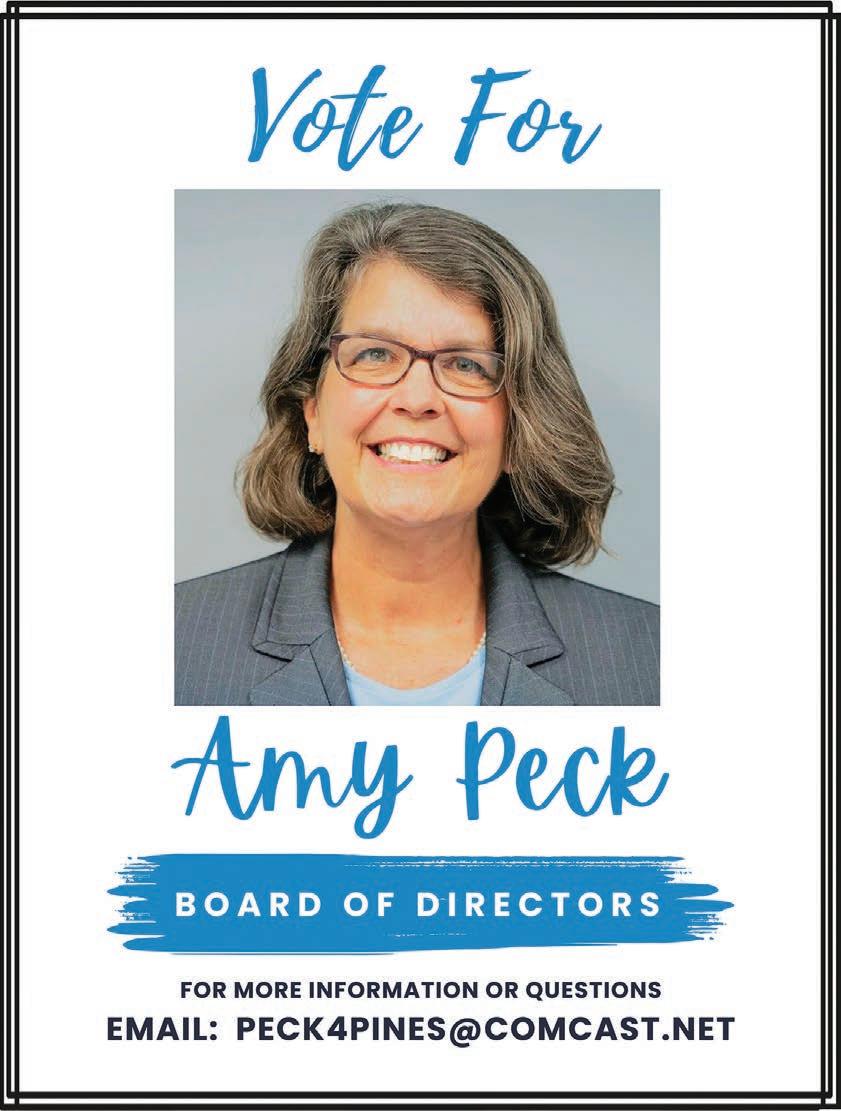
Why the Ocean Pines Volunteer Fire Department needs a decontamination station
By ROC Edition Staff
The Ocean Pines Volunteer Fire Department (OPVFD) is seeking to include an on-site decontamination station as part of its planned new South Side Fire Station. While the topic was only briefly addressed during the recent town hall, a deeper look into the health risks faced by today’s firefighters reveals why this station is not just a convenience but a necessity.
Firefighters are routinely exposed to a wide range of hazardous substances, many of which are released during structure fires or embedded in the gear they wear. Among the most concerning are PFAS (per- and polyfluoroalkyl substances), PAHs (polycyclic aromatic hydrocarbons) and a long list of other toxic compounds. These include benzene, aldehydes, acid gases such as hydrogen cyanide, flame retardants and heavy metals. Exposure occurs both on the fireground and afterward, as these substances continue to off-gas from gear and accumulate as dust in fire stations.
PFAS, sometimes referred to as “forever chemicals,” are particularly troubling. Commonly used in firefighting foams and in the water-resistant coatings of turnout gear, PFAS compounds are nearly impossible to break down in the environment or the human body. Multiple studies have linked them to cancer, immune system disruption and other long-term health problems. Two of the most studied PFAS chemicals are classified as known human carcinogens.
Repeated exposure to the chemical cocktail present in firefighting environments has been associated with higher rates of lung, bladder, skin, testicular and kidney cancers among fire service personnel. These risks do not vanish once the flames are extinguished. The very gear that protects firefighters in the field may continue to contaminate the firehouse long after a call, contributing to cumulative exposure through air and surface contact.
A dedicated decontamination station at the new south side facility would offer a critical line of defense against this invisible hazard. The function of a decon station is to prevent hazardous materials from being tracked into living and working quarters, where contamination can continue over time. It
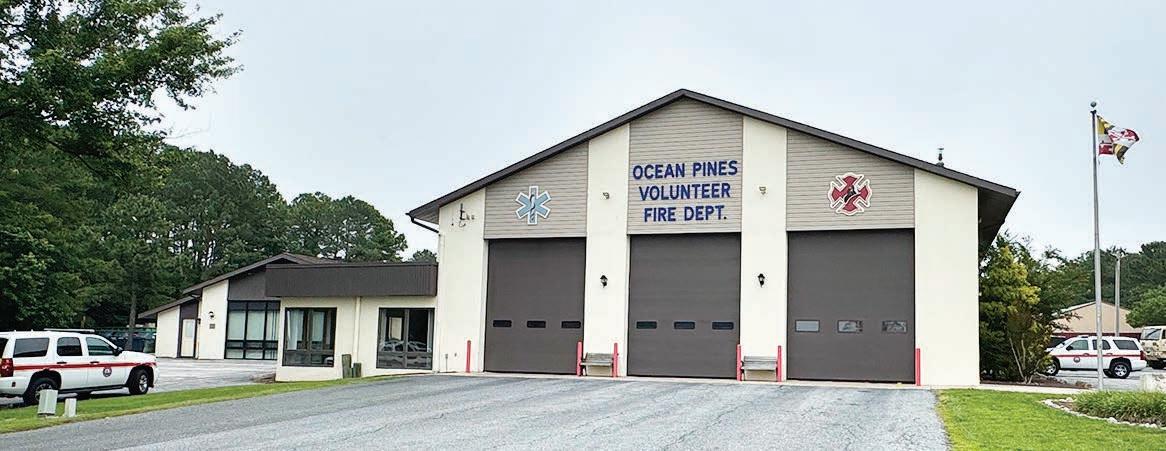
The new South Side Fire Station will include a decontamination area, an essential addition to protect firefighters from toxic chemicals and cancer-causing contaminants. It will allow them to remove hazardous materials from their gear and bodies, significiantly reducing long-term health risks linked to repeated exposure to smoke, chemicals and carcinogens.
provides a controlled environment where gear can be cleaned and stored properly, reducing airborne particulates and surface contamination inside the station.
Research has shown that fire departments with established decontamination protocols see measurable improvements in firefighter health and safety. Blood testing in departments with strict PFAS decontamination procedures has revealed lower levels of chemical buildup in firefighters. In addition to health benefits, regular gear decontamination can extend the life of expensive protective equipment, saving departments thousands of dollars in replacement costs over time.
Incorporating a decontamination station into the OPVFD’s infrastructure is not about adding bells and whistles; it’s about meeting the evolving health and safety needs of the modern fire service. As awareness of occupational cancer and chemical exposure continues to grow nationally, many departments are adopting stricter contamination controls and building infrastructure to support long-term health protections.
The risks faced by firefighters extend far beyond the immediate dangers of flames and smoke. Their occupational environment includes exposure to some of the most harmful substances known to science. A firehouse should be a refuge, not an extension of the hazard zone. Installing a decontamination station is a practical, sciencebacked step toward protecting the health of those who serve.
Editor’s Note: This article draws on research originally compiled by Amy Peck, a 2025 candidate for the Ocean Pines Board of Directors and publicly posted to the ROC website. The information includes input from those with expertise in environmental and fire
safety engineering. Ocean Pines Volunteer Fire Department President Joseph Enste also confirmed the accuracy and importance of having a decontamination station in the new South Side Fire Station.

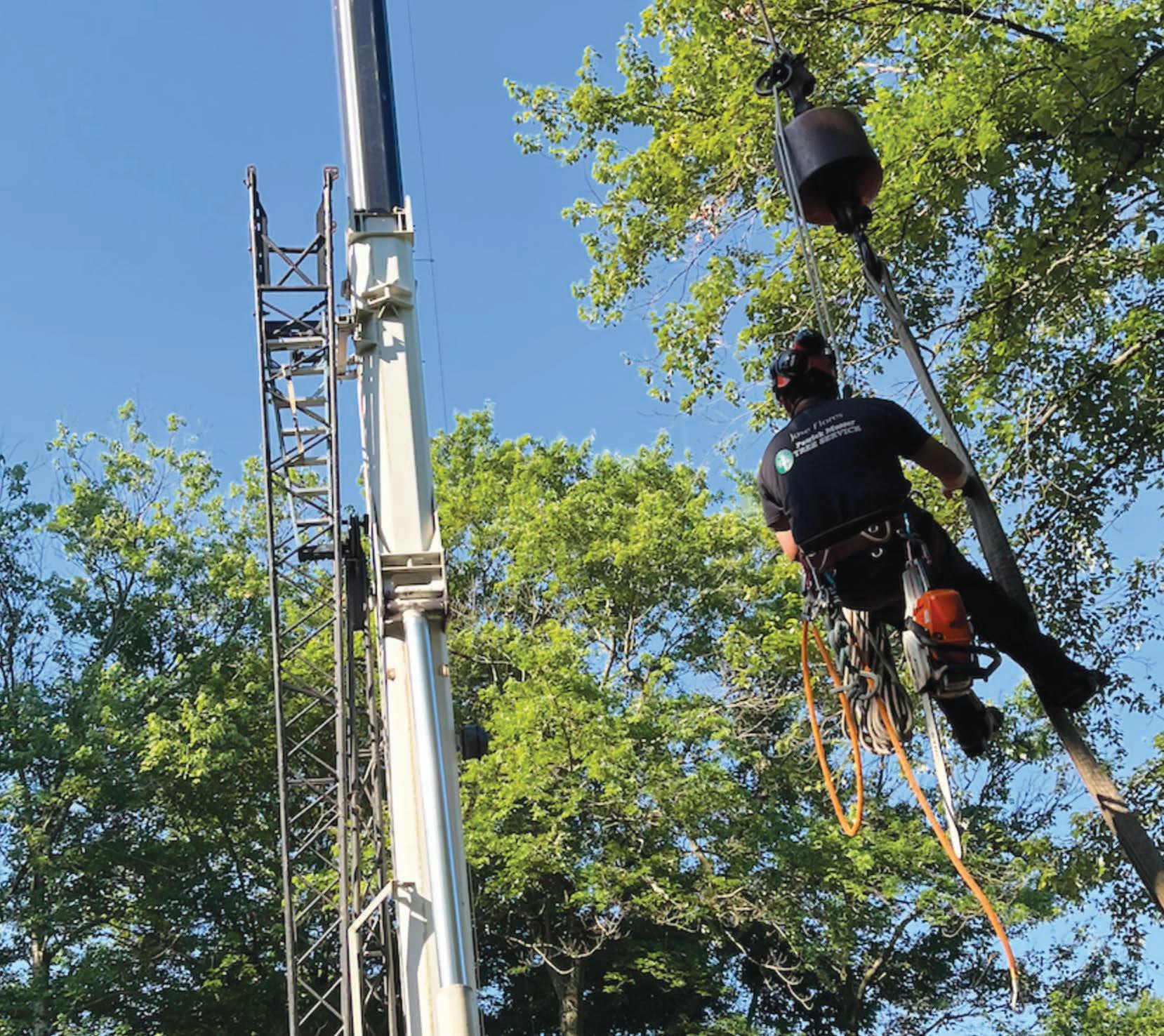
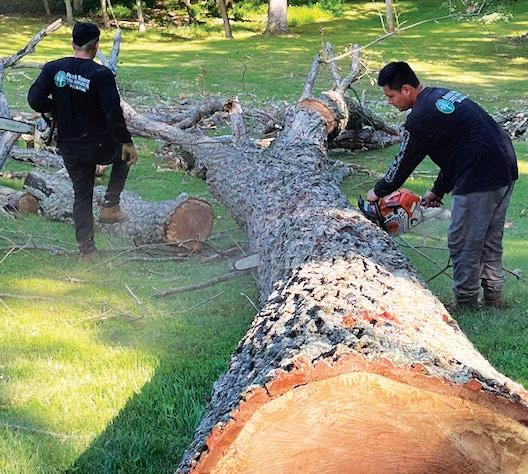
Berlin approves the reclassification of parcel 57 at Heron Park from residential to commercial
By Giovanni Guido Staff Writer
Parcel 57 at Heron Park has been considered an R-1 Residence District for years. At their most recent meeting, the Berlin Mayor and Council unanimously approved to change the zoning classification to B-2 Shopping District, which they believe better reflects the property’s activities. The council based their reclassification decision of the 9.35-acre property on a material error as well as a change of character in the neighborhood.
For this reclassification process, the owners of the property, Sandy and Palmer Gillis of Coastal Ventures Properties, were represented by Mark Cropper, a member of the Ocean City law firm Ayres, Jenkins, Gordy & Almand. Cropper detailed the reasoning behind reclassifying it on the basis of the two premises previously stated.
The lawyer said the material error lies in the use of the property, which was home to the Tyson poultry
processing plant. With the property being used for industrial purposes, there is a clear contradiction in the zoning classification of R-1 Residence District.
“You have a property that’s presently zoned R-1, and there has been an industrial use on it as long as I’ve been alive, being Tyson Poultry Plant. Those two things could not be more inconsistent,” Cropper said.
Not only has the property not been used for residential purposes, it is actually restricted from doing so, he said. In a No Further Action letter issued by the Maryland Department of the Environment, there is a prohibition specifically regarding the construction of residential buildings on the property.
Cropper continued on to the premise of a change of character in the neighborhood, which he based on the fact that the poultry plant no longer remains on the property, having been demolished in 2024 for future commercial and retail purposes.
“The Tyson Poultry Plant doesn’t
exist anymore. That was that neighborhood and therefore that is a change in that neighborhood that also is consistent with this request,” Cropper said.
The governing body is able to approve of the zoning classification under either of these premises if they wished. But if the body wants to continue with the premise of the neighborhood character change, they must first clarify what they consider to be the neighborhood of parcel 57, Cropper said.
“I provided two possible definitions of the neighborhood. The first definition … is basically all of the Town of Berlin if you wanted to consider the Town of Berlin, because it’s a small town, the neighborhood. Or if you wanted a more restrictive definition of neighborhood, … that neighborhood I define as being bounded on the north by US Route 50, bounded on the south by Franklin Avenue, bounded on the east by Route 113 and bounded on the west by 818,” Cropper explained.
is that those areas were affected by the change in the character of the neighborhood. That is, the demolition of the Tyson plant.
“(It identifies) an area impacted by whatever the change is that has occurred. So, as a result of the Tyson Poultry Plant no longer being in operation, what areas of Berlin have been most impacted by that. And it could include some residential, some retail, some commercial. I don’t think it has to be exclusively one or the other,” Cropper stated.
The lawyer added that the council could also decide to make a definition of its own for the neighborhood instead of using the two he provided.
Finishing up his statement, Cropper clarified to the public that this zoning change is a condition of an agreement made between Coastal Ventures Properties and the town. Therefore, the change must be made in order to go forward with the redevelopment project of parcel 57.

The lawyer gave some clarification on the second definition for the neighborhood. He stated the justification for these specific boundaries

After the lawyer’s presentation regarding parcel 57, the council unanimously approved the zoning reclassification of the property from R-1 Residence District to B-2 Shopping District.

Berlin discusses new drafts of ordinances regarding business and peddler licences
By Giovanni Guido Staff Writer
Newly drafted ordinances for both business licenses and peddler licenses were discussed between the Berlin Mayor and Council at their most recent meeting. The redrafting process to replace the original documents, which are currently in effect, began after two incidents occurred that raised concerns about the issuance and revocation of these licenses in the Town of Berlin.
For the original business license ordinance, it consisted of a single paragraph declaring the governing body has the authority to make necessary changes to the rules and regulations of the issuance of business licenses. The new ordinance draft adds nine new line items that detail the rules and regulations of imparting these licenses.
In regards to the peddler license ordinance, the original document was scrapped altogether and redrafted with completely new language. Town Attorney David Gaskill, who redrafted both ordinances, explained that he believed the original document to be poorly drafted, thus prompting his decision.
Because of the limited and inadequate language for both the business and peddler license ordinance, it ultimately allowed for the misuse of the licenses.
Employees of the tourist attraction that offers rail biking tours and kayaking, Tracks & Yaks, were causing a disturbance in the town for both residents and businesses. The situation led to many residents of Baker Street and a local business owner to bring their concerns to the council. However, because the document for business licenses was limited, it did not give the council the proper tools to be able to handle the situation as they wanted. Gaskill hopes to solve that problem with this new draft.
“You’ll notice that the most important provision of this draft that addresses any issues would be the fact that now this draft would allow the Mayor and Council to refuse to issue a license or revoke a business license based on certain factors, such as excessive noise, excessive traffic, excessive loitering outside the establishment or after business hours, trash accumulation, disorderly conduct, things like that,” Gaskill said.
Although the situation has since
been resolved, Gaskill and the majority of the council agreed that it is important to have the ability to refuse the issuance of or revoke a license, even if it will never need to be used.
Councilman Steve Green voiced his approval of Gaskill’s draft, believing it had all the necessary language the council was looking to have in the document.
“I think it’s a good tool to have in our toolbox. But I do hope it’s never used, and it probably will not be. I’m not usually one to just throw things into a code, but we do have recent precedent where we would have potentially used it. So, I think it’s smart,” Green said.
Mayor Zack Tyndall also stated his approval of Gaskill’s draft.
“It could have been very helpful, at least as a way to have a conversation. Hopefully, we never have to use it, but at least we can sit down with a party and say, ‘Hey, look, this is the path we’re heading down. We really don’t want to go there,’” Tyndall said, referring to the revokement of a business license.
The council members then directed their attention to the other ordinance draft for peddler licenses.
The incident that sparked the review and redraft of the peddler license ordinance was an attempted break-in to the house of town resident Mary Hedlesky by a door-to-door salesman after the peddler knocked on her door to make a sale. Hedlesky recounted her experience to the council during one of its public meetings. There, the council decided to look into changing or even getting rid of the ordinance.
When the new draft was shown to the council and the public, Hedlesky, who attended the meeting, was asked what she thought of the new draft of the ordinance, since she was the person that set off the chain of events leading to the redrafting.
She stated simply, “I’d like to get rid of it altogether, but this is great.”
Councilman Green, who once agreed with Mary’s assertion of ridding the town of this ordinance altogether, pointed out that disposing of the ordinance altogether is considered unconstitutional, which is why the ordinance is merely being redrafted instead of disposed of.
The council then discussed the specifics of certain areas in the
drafted document with Gaskill.
One of the items in the document they pointed out was the time limit that the document will put in place for when peddlers can go door to door, selling their products and services. The time slot agreed upon by the council was 10 a.m. to 4 p.m., from Monday to Friday. Additionally, the council decided peddlers also cannot go door to door on officially recognized town holidays.
“We want to make sure it’s reasonable, but people also in the Town of Berlin have a right to be able to reasonably enjoy themselves,” Tyndall said about the time slot change.
Another area of the document discussed among the governing body was the license fees that must be paid to the police department. In the original document, it states explicitly the amount in dollars that a business must pay to receive one of the licenses. Gaskill reworded that section of the document to instead state that the council will decide the amount at a later time.
Town Administrator Mary Bohlen expressed her approval of this change. She said that stating a dollar amount in the document was a mistake that makes it difficult for possible changes in the cost to be made later, since there is a longer process to making changes to an ordinance.
Bohlen then gave her recommendation for what she believed would be a good cost.
“My recommendation is going to be that the basic fee is $150 plus a fee for every person that they’re putting out on the street. 25, 75, 100? That’s something that you can determine,” she said.
Within the next few months, additional changes will need to be made in both documents. Upon completion, both ordinances will be brought back up for first readings at future Mayor and Council meetings, where they will officially be adopted by the town. Until then, the current ordinances remain in place.
Home Improvements

Misunderstood and misused: The
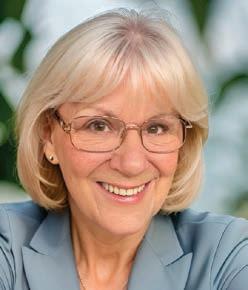
In today’s polarized climate, calling someone a “muckraker” is often meant as an insult, a way to dismiss reporting that makes people uncomfortable or raises inconvenient questions. But the truth is, muckraking has a long and respected history, one rooted in the very idea that transparency and accountability are essential to a functioning democracy.
The term muckraker was popularized by President Theodore Roosevelt in the early 1900s, during a time when journalists were exposing the underbelly of powerful institutions. These reporters investigated child labor, unsafe food practices, corporate monopolies and political corruption. They weren’t stirring up drama, they were shining a light on issues that affected real people. And their work led to major reforms.
The term eventually came to be used in reference to investigative journalists who exposed crime, fraud, waste, public health and safety violations, graft and illegal financial practices. A muckraker’s reporting might span the world of business, government or any area where silence and secrecy allow problems to fester.
It’s worth remembering that these efforts weren’t always welcomed by the subjects of the reporting. Just like today, those in power often try to discredit the messengers. But the result of muckraking wasn’t chaos; it was progress.
In that context, calling local journalists or community fact-checkers “muckrakers” shouldn’t be viewed as an insult. It should be seen as an acknowledgment of the work required to keep institutions honest and residents informed.
Unfortunately, in many communities, the word has been misunderstood and misused. Some have tried to weaponize it, accusing those who raise
real meaning of muckraking
questions or report on governance of “mudslinging” or “creating division.”
That kind of rhetoric is not only false; it’s dangerous. It discourages participation, silences important conversations and leaves residents in the dark.
At ROC Edition, we believe in the value of asking hard questions. We believe residents deserve to know how decisions are made, how money is spent and whether policies are being applied fairly. That kind of reporting may make some uncomfortable. But discomfort is not the same as dishonesty.
Local journalism has a role to play in protecting communities not just from corruption or mismanagement, but from apathy. The work of holding elected leaders, committee chairs and public institutions accountable doesn’t always win popularity contests. But it does preserve trust. And trust is the foundation of every strong community.
If that’s what people mean when they call us muckrakers, we’ll take it, because this isn’t about gossip or personal attacks. It’s about making sure that residents have the facts, facts they can use to vote, to speak up and to stay informed.
When the full truth is allowed to surface, communities become stronger, not weaker. Muckraking, at its core, is simply the act of lifting the rug where others would rather not look and helping everyone to see what’s really underneath.
Sherrie Clifford Publisher, ROC Edition
The ROC Staff
Sherrie Clifford Publisher/Editor 856-873-6029 sclifford@oceanpinesroc.com
Staff Consultant News Editor editor@oceanpinesroc.com
Giovanni Guido Staff Writer gioguido56@gmail.com
Roger Marino Columnist marino.roger@aol.com
Lara Spaid Advertising Sales 410-443-4717 laraspaid@comcast.net
If someone has to break the rules to win, they’ve already lost
In every election, large or small, there is one principle that should rise above personalities, parties or preferences: fairness. Without it, the outcome means nothing.
That’s why any effort to manipulate the rules, influence the process behind closed doors or blur the lines between official authority and personal agendas should concern every voter, no matter who they support.
This isn’t about accusations. It’s about principles. Because when elections are treated as something to be controlled rather than earned, trust disappears. And once that trust is gone, it’s hard to get back.
We all know what fair elections are supposed to look like. Voters receive accurate information. Ballots are distributed securely and counted transparently. Candidates compete
on ideas—not insider advantages. And no one, not board members, not committee chairs, not their friends or family should use their position to tilt the playing field.
That’s the standard. Anything less invites doubt.
Too often, however, when legitimate questions are raised about transparency or process, they are dismissed as “conspiracy theories” or “divisive rhetoric.” But asking for fairness is not an attack. It’s the bare minimum we should expect in a self-governing community.
And when someone tries to shut down those questions when they say “just trust us,” that’s when we should start paying even closer attention.
Elections don’t have to be perfect, but they do have to be clean. When people use influence to benefit certain candidates, when
LETTER TO THE EDITOR
Beautiful blueberry bliss at Friendship Farm
Dear Editor:
We’ve driven by the Friendship Farm sign at 3 Penny Ln., off Worcester Highway, countless times while driving out to Berlin and beyond, and a year or so ago, during blueberry season—mid-June to August—we pulled in and picked some blueberries.
A couple of mornings ago, the sun shining too brightly but the temperature below 100 degrees, my dear wife said, “How about going out and picking some blueberries?”
“Let’s Go!”
We drove out to nearby 10210 and into the farm—open Wednesday through Sunday, 7:00 a.m. to 5:00 p.m. —and signed in at the booth and picked up white plastic pails that
could hold up to seven pounds of blueberries.
Then off we went to blueberrypicking heaven: acres and acres of blueberry bushes as far as the eye could see, loaded with tantalizing, eminently pickable bunches of big, ripe blueberries.
Once I got the knack, I found it hard to tear myself away. We ended up with two almost full plastic buckets and eleven and a half pounds of blueberries.
All in all, it was a fine, fruitful early summer’s day outing at friendly Friendship Farm. Stop by and enjoy the pickin’s.
Ralph ”Blues Picking” Ferrusi
unauthorized official symbols are used in campaign materials or when committee oversight appears to favor one side over another, it should raise concerns.
Even more alarming are the behind-the-scenes efforts when candidates rely on friends, family or allies to launch smear campaigns, run hate sites or spread misinformation about their opponents, all while keeping their own hands clean. It’s a familiar tactic: encourage the attack privately, then publicly deny any involvement. That’s not leadership. That’s manipulation.
And here’s the truth: If someone feels they need to interfere, hide, distract or mislead in order to win, then they’ve already lost the moral authority to lead.
Winning at any cost isn’t leadership; it’s desperation. And
communities built on that kind of leadership eventually pay the price through division, dysfunction and deep, long-lasting distrust.
Let’s make sure local elections reflect the values they claim to hold: integrity, fairness and respect for the democratic process. And let’s look closely at who is actually doing the work, digging into records, asking questions, reporting facts and standing up for the community, even when it’s uncomfortable. Talk is cheap. Showing up, staying informed and holding leadership accountable takes effort.
If someone has to break the rules to win or get others to do it for them, then they’ve already lost.
Sherrie
Clifford Publisher, ROC Edition


Seize the Day STANDING Room Only
Carpe Diem, a Latin term that encourages young people to seize the day—to make the most out of every waking hour.
Life is short, and that is not a term taken lightly by the elder statesmen of our time.
So, I’m walking down an Ocean Pines public street to visit a friend and stroll in front of a nicely groomed lawn to witness a homeowner complaining vociferously to the person next door about planting too many shrubs between his property line and theirs.
It seems one of them recently moved into the home next door and decided to run a line of shrubbery between Mr. X’s property and his own. All very legal. Mr. X took affront to the gardening venture and let it be known to the new neighbor. The rift began and continued regarding trash cans, cars parking in front of their houses, too much noise with their dogs, etc.
Both neighbors came to Ocean Pines from cities where they no longer wished to be residents. Both happily retired, longing for the

By Roger Marino
comfort of the amenities that living in the Pines offers. They both love their new home, the new furnishings, the freshness of the paint and the smell of salt air. When Mr. X and his neighbor bought their houses, they happily agreed to the homeowners association’s recommendations presented to them when they signed the long-lined contract as homeowners in this Worcester County paradise. And I moved along in my desire for a friendly afternoon of visiting.
Now I come to a friend’s house down the street in the same community. Haven’t seen him since we worked together many years ago. No sooner did I sit down to chat when he apologized to me about a neighbor who was parking his RV in his driveway, blocking our water view.
“I don’t talk to him anymore,” he grunted, explaining that the RV’er is unreasonable, nasty and foulmouthed. My friend also told me that it was legal to park the vehicle in his driveway. My kind-hearted, very friendly former co-worker said his neighbor will not speak to him anymore. Both my friend and the guy next door are new to the Pines and this part of the Maryland world. All that drama in one day.
The next day, I attended my doctor appointment and between taking my temperature, blood pressure and reviewing my list of medications, he began discussing his new home in West Ocean City and the venture of moving there.
It seems he and his wife, who is also a doctor, are avid gardeners. However, the neighbor next door did not appreciate the pear trees and various other vegetables they grew close to the fence line. The neighbor felt the trees attracted deer, the low-growing veggies attracted rabbits and the colorful, brightly
flowered plants attracted bees and other insects.
So, my medical professional did the thing most red-blooded neighbors would do in these circumstances.
Dale Carnegie preached in my Winning Friends and Influencing People classes: “the best way to win an argument is to say nothing.” So, they picked up, sold the house and moved to West Ocean City. Now everyone is happy, justice has had its day, and another family purchased the house for the sales-closing reason that they are garden lovers and the foliage in the yard next to the nervous neighbor is “already equipped with a good start.”
Carpe Diem. Enjoy the day, please. There is always a way to work things out. “Let’s talk it over” are four words seldom spoken in an argument.
We move to this garden paradise because of the physical and spiritual atmosphere it holds. We are in a daily and yearly getaway from the daily routine from whence we were delivered. Life is mostly good, except when we choose to believe it isn’t.
Before you purchase a parcel of land, look around at the landscape. Perhaps there is a poultry farm within sight; perhaps it is a cornfield. You may see merit in living among the farmland. Or you may see the negatives of neighboring within the sounds and smells of egg-laying, inexpensive chicken dinners, protein-laden beef and healthy milk products.
Ask whether you might someday have neighbors in row houses where the cows now graze. Research the homeowner rules long before you sign on the dotted line. Know that the privilege of having a license tag marked “LOCAL” doesn’t exempt you from the sights and sounds made by traffic jams and enthusiastic beachgoers. If it doesn’t fit your needs or desires, move on in your search for the perfect homeland paradise. You can’t pick your neighbors, but you can research your expectations. There is something for everyone in this Delmarva paradise. Remember Carpe Diem: seize the day, make your life happier and make everyone around you the better for it.


ROC Life
Reggae music concert to be held at historic Germantown School
By Giovanni Guido Staff Writer
In years gone by, the Germantown School Community Heritage Center has held concert events that featured jazz, blues, gospel as well as rock and roll. Another genre of music that has been featured previously is reggae, which will be returning to the center on Saturday, July 19, from 6 to 9 p.m.
“(People) can expect an evening of fun, great music and an opportunity to meet new people and help to support the Germantown School Community Heritage Center at the same time,” the heritage center president, Barbara Purnell, said.
Attendees of the Reggae at the Germantown School event will be able to see the local band Island Sounds perform. This band was specifically requested by supporters of the center, according to Purnell.
People can purchase tickets for the event either ahead of time or the day of. Tickets will cost $10 for each person. Food will also be provided, such as hot dogs, chips and soda, all of which are $5. However, people are also allowed to bring their own food as well as chairs to the center at 10223 Trappe Rd.
This concert is part of the heritage center’s mission statement which, according to Purnell, is “to hold cultural events that celebrate the rich history of our region.” Purnell added that all proceeds from this concert event will go toward the heritage center.
“The funds will help to support the operational costs of the Germantown School Community Heritage Center. For example, our free cultural events, our museum exhibits, our walking tours of the property and museum, field trips and the supplies and maintenance requirements for the center,” Purnell said.
Many of these features Purnell listed highlight the history of the property on Trappe Road. Purnell stated that the heritage center was originally a school established in 1922 for African American children during racial segregation.
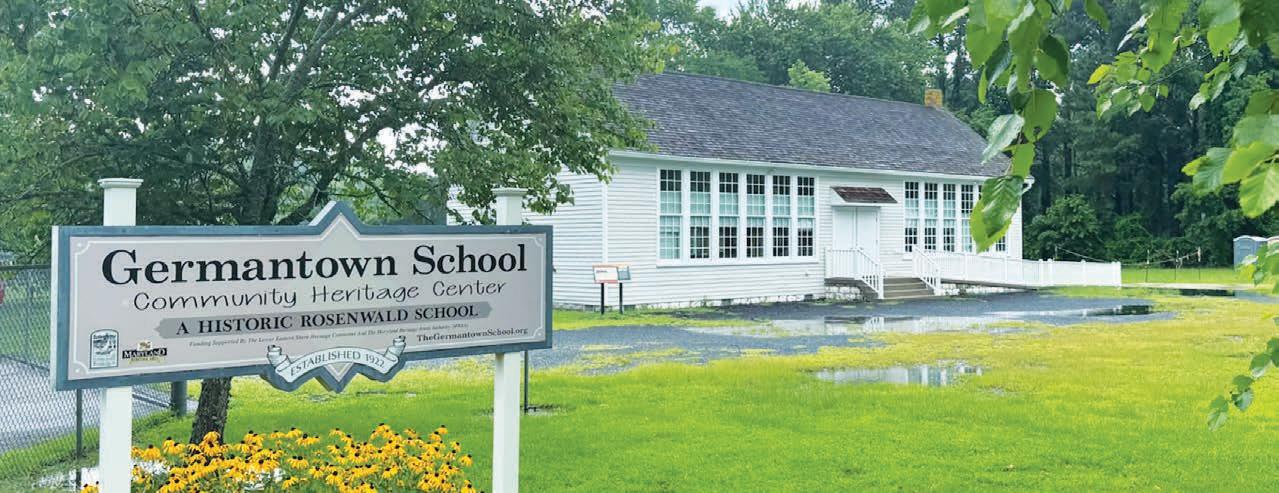
The school was one of 11 opened in the county, which is only a few of the many opened in the country as part of the Rosenwald Rural School Building Program. According to the Encyclopedia Virginia website, this program began in 1912 as a collaboration between educator Booker T. Washington and businessman Julius Rosenwald. Their shared goal was to help improve the economic and social turmoil in African-American communities by educating the residents. When it ended in 1932, the program managed to procure funding to build and supply a total of 5,357 schools throughout 15 southern states.
The Germantown School provided education for approximately 50 students from grades 1-7 every year. With the school closing its doors in the 1950s, it provided an education to at least 1,400 children during its time of operation.
During the 1960s, the defunct school would be handed over to Worcester County to be transformed into a garage that would house vehicles owned by the county, Purnell said. The building would remain as such for roughly three decades.
“The community was concerned that the rich history of this important part of American education, and, specifically, African American contributions to education would be lost. In the late 20th century, a
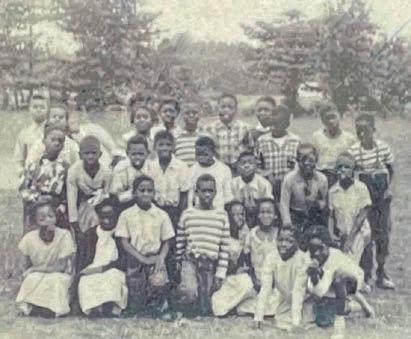
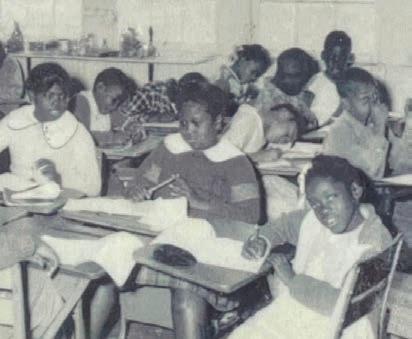
Local reggae band will be performing at the historical Germantown School. Once a school for African American children during racial segregation, the building now acts as a community heritage center that preserves the history of the property and the important time it resided in.
community group formed to restore this important community landmark. They approached the county commissioners requesting the return of the deed, promising to create a community center to serve not only Germantown but all people who visit. Once the deed was returned in 2000, the community began to raise money to restore the school and provide a place that continued the school’s legacy,” Purnell explained.
In 2013, the building reopened its doors as the Germantown School Community Heritage Center. Today, it remains the last school building in the county created through the Rosenwald program.
“We are a museum and cultural center open to everyone and are visited regularly by people across the region, state and nation. We are not an operating school; instead, we provide programs that mirror the
original educational and cultural mission of the Rosenwald school,” Purnell said.
Purnell has been a massive part in the preservation of the building. Ever since 2000, she and many others helped bring the former school and its history back to the community. It is fitting for her to be a part of the preservation project for she, in her youth, attended the Germantown School as a student.
As Purnell previously stated, the center is holding this reggae concert this Saturday as part of its mission statement to raise funds through hosting events every year. Those interested in attending the reggae concert at the center can call 410-641-0638 to purchase tickets in advance. Tickets can also be purchased at the center’s gate the day of.
Ocean Pines Beach Club offers a perfect summer escape in Ocean City, Md.
By Sherrie Clifford ROC Edition Publisher
With the summer season in full swing, the Ocean Pines Beach Club has become a true gem for residents and guests seeking a relaxing and convenient coastal getaway. Located at 49th Street and the beach in Ocean City, this oceanfront amenity offers more than just access to the surf; it delivers a full-service experience that blends comfort, entertainment and classic summer charm.
Open daily from 11 a.m. to 6 p.m., the Beach Club provides easy access for Ocean Pines residents who hold a pool membership and have purchased the Beach Club parking pass. Parking is plentiful and check-in is a breeze, allowing more time to unwind. Whether arriving early to claim a spot or later in the day for music on the patio, the setup is smooth and stress-free.
The outdoor pool, which ranges from 3 to 5 feet deep, is clean, well-maintained and surrounded by palm trees and soft sand, offering a tropical atmosphere just steps from the Atlantic Ocean. Guests can choose from chaise lounges or umbrella-shaded tables and chairs, with plenty of seating for families, couples or individuals looking to relax poolside. On a recent visit, there was no shortage of umbrellas, making it easy to find a cool, shaded spot.
The Beach Club’s food and beverage service, now managed by Touch of Italy, has quickly earned praise from patrons. Well known in Ocean Pines for its high-quality offerings at the Yacht Club and Clubhouse Bar and Grille, Touch of Italy brings the same elevated hospitality to this beachfront location.
Waitstaff were attentive and friendly, checking in regularly to take orders and deliver food right to the tables and patrons around the pool deck. Service was quick and professional and the food arrived fresh and flavorful. Families especially appreciated the variety of children’s options on the menu, while adults enjoyed cool drinks and well-prepared meals under the umbrellas.
Inside the clubhouse, guests will find a perfect place to take a break from the midday sun. Just beyond the doors, the patio faces the ocean and transforms into a lively
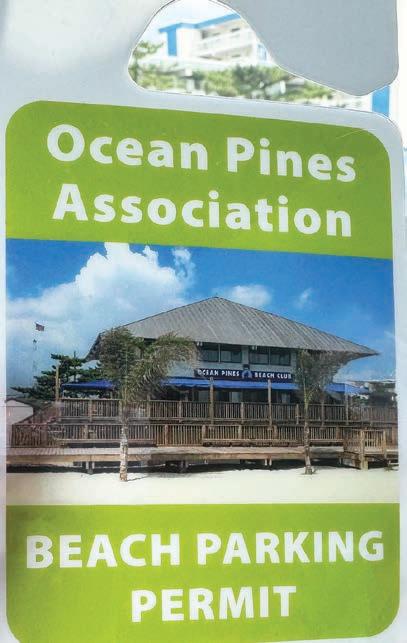
With a meticulously maintained pool, ample shaded seating and highquality food, the Ocean Pines Beach Club offers both guests and residents a relaxing summer retreat just steps from the Atlantic Ocean in Ocean City, Md.
social space in the late afternoon. Every Friday and Saturday from 3 to 6 p.m., live music fills the air, creating a perfect backdrop to enjoy a cocktail, reconnect with neighbors or simply listen to local musicians as the waves roll in.
What sets the Beach Club apart is how it blends the atmosphere of a private resort with the ease of a community-run facility. With controlled access, responsive staff and a full suite of amenities, it’s one of the most enjoyable and accessible options for those looking to escape to the ocean without the hassles of public beaches or crowded boardwalks.
Whether you’re traveling with kids, meeting friends for lunch or just enjoying some solo sun and sea time, the Ocean Pines Beach Club checks every box. With convenience, cleanliness and charm, it’s another standout benefit of living in the Ocean Pines community and one that many residents are discovering for the first time.
The Ocean Pines Beach Club is more than just a pool; it’s a summer destination.
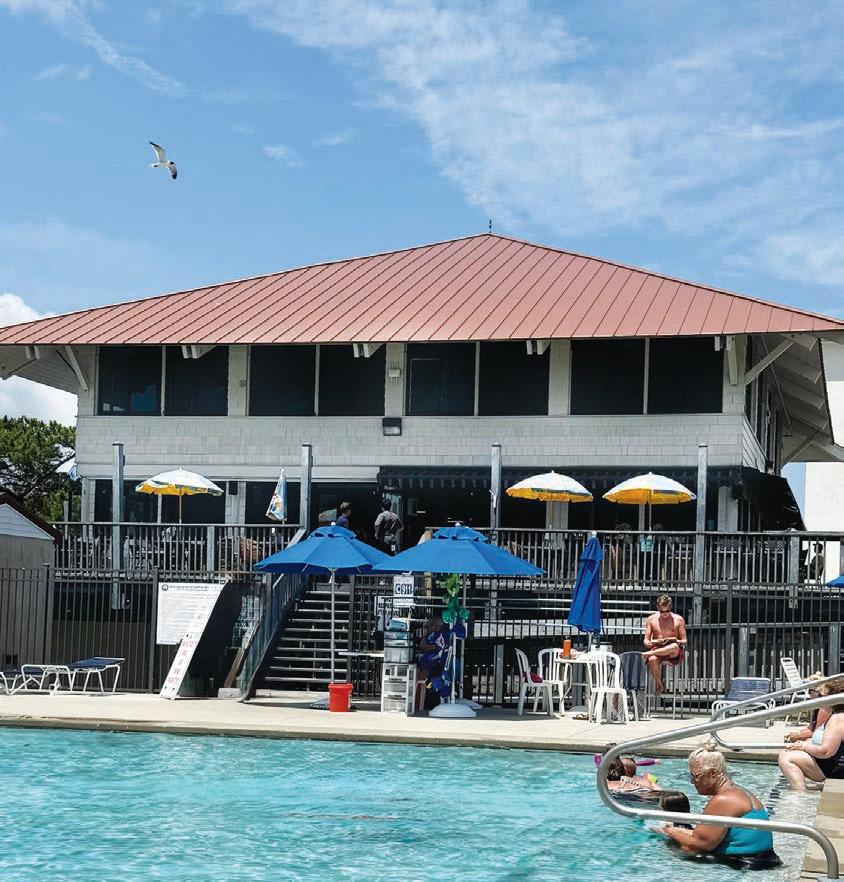

New floral shop, Sylvie Rose Floral Design, blooms in downtown Berlin
By Giovanni Guido Staff Writer
A new floral shop has taken root and blossomed on Jefferson Street in the Town of Berlin. Owner Kelley Dean opened her store, Sylvie Rose Floral Design, on June 23 after three long years of trying to find the perfect location. After one potential property fell through, she bided her time until, eventually, her patience was rewarded with the procurement of 17 Jefferson St.
But even before she knew what street it would be on, Dean knew her business had to be in Berlin.
“Several years ago, I moved here and have now built a home and a life in downtown Berlin … I’ve always loved this town for the people and the atmosphere. Our small town with passionate small business owners, great creative vibes and an incredible sense of community. There was really no question that this is where I wanted my business to start and grow,” Dean said.
The name of the shop was also something she had set in stone from the start. Deciding on the name that she did was a “very personal and important story for me,” the owner said.
“My grandmother’s name was Sylvia, but for as long as they were alive, my grandfather always called her Sylvie. She loved roses—all flowers really, but roses were a special flower for the two of them. They both passed away a few years ago, so I wanted the name to honor her, their love for each other and my love for them,” she said.
Having been in the flower business for 20 years, Dean has accumulated extensive experience in the field. During that time, she became the owner of a shop she worked at, a position she held for eight years until she sold it to pursue her new endeavor in Berlin.
Although she has all these years of experience, she is still new to working in downtown Berlin. Dean said that one of the biggest challenges after she opened her business was spreading the word about what Sylvie Rose Floral Design has to offer.
One way the business is getting the word out is through social media platforms, such as Facebook and Instagram. Dean is also currently getting her business’s website built, which can broaden her sales potential.



Getting the word out was not the only challenge Dean had to face while opening her business, however. Fortunately, she did not face those challenges alone.
“Family and friends have really helped in every single aspect. Physical, mental and emotional support all around … It’s an impossible task to take on alone, and I am beyond blessed for the people in my corner supporting this journey. Also, the Town of Berlin and the Economic Development team have been so supportive and a pleasure to work with,” Dean said.
Since the floral shop’s opening on Jefferson Street, the owner has seen a steady current of customers come and go from her business. Dean’s shop offers everything from fresh flowers and bouquets to vase arrangements and indoor plants.
“All items can be picked up or
delivered throughout Worcester County. We do arrangements for every occasion—birthdays, anniversaries, just because, etc. In addition, we offer sympathy arrangements for funeral services. We do all special events, including weddings, bridal/ baby showers, parties,” Dean added.
For the near future, Dean has plans of offering more products to help her business grow, such as adding an inventory of prints, jewelry and candles from the local area. She also plans to provide different services in the future. For example, floral classes and workshops that people can sign up for.
“I have a large, open space with a nice outdoor patio that can accommodate groups. My website is being built now and people will be able to register online for the classes I am offering as well as book private events … I also have 2 mobile flower

carts that are available to rent for a ‘Flower Bar’ at weddings, bridal showers, etc. These are popular for the guests to make their own flower bundles to take home as a party gift,” she said.
Sylvie Rose Floral Design is open on Mondays through Saturdays from 10 a.m. to 5 p.m. and Sundays from 9 a.m. to 1 p.m.
Finally opening her own business in the field that she loves and knows best has been a gratifying experience for Dean.
“I’m proud of the journey and all the hard work it has taken to get here. I am incredibly happy to be back doing what I’m passionate about in a place I love. I’m excited to see how it grows.”

Bridal boutique, inspired by “Runaway Bride,” gallops its way to Berlin this summer
By Giovanni Guido Staff Writer
The anniversary of the classic romantic comedy film, “Runaway Bride,” is widely celebrated in the Town of Berlin. In the past, the town has held multiple events related to the 1999 film. One annual highlight is a mile-long run/walk event, which encourages people to dress up in wedding gowns and tuxedos. These celebrations are held by Berlin due to the majority of the movie being filmed there.
With the romantic comedy being a point of pride for the community, Madison Stoltz intends to open up a bridal boutique at 3 S. Main St. that is inspired by the Garry Marshall film. This new bridal boutique will be aptly named Runaway Bride Berlin.
“I’ve always been a big Garry Marshall fan, and I love Julia Roberts. Runaway Bride has been one of my favorite movies for as long as I can remember. The fact that it was filmed in one of my favorite towns and connects to what I do for a living just kind of all came together and made perfect sense,” Stoltz said.
The future owner brings with her years of experience in the field as well as a background in being a business owner. Since 2019, Stoltz has been the owner of her own bridal boutique in Pennsylvania, named Madison Marie Bridal.
“I’ve loved every second of it. Helping brides find their dream dress is something I’m so passionate about, and opening this second location in Berlin feels really special,” Stoltz said.
Although an opening date is not officially set, the new boutique is planned to open sometime this summer. As the building undergoes light renovations, Stoltz will share updates on the business’s progress through Facebook and Instagram.
The inventory of the bridal boutique will mostly include items related to brides, such as wedding gowns, veils and bridal accessories. However, Stoltz intends to include various other items to attract even more customers.
“I also have plans for a fun little collection of things for people who aren’t shopping for a dress. Think t-shirts, accessories, wedding gifts and even a bit of makeup. It’ll be a


small mix of things I love that match the feel of the shop,” she said.
And, of course, Stoltz intends to feature “a few subtle nods to the movie for fans who know and love it.”
Despite the boutique drawing inspiration from “Runaway Bride,” the future business is not solely intended for fans of the film.
“The boutique is really about creating a personal, private bridal shopping experience, with a little wink to the town’s movie history.”

